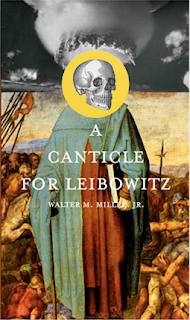I was thinking about The Gravity Well for the 1960’s when I
realized I was apparently trying to avoid proclaiming The Gravity Well award
for the 1950’s. So we’ll just consider
this an extra bonus (that is not redundant, think of a bonus and then think more).
I could have sworn that I did this post for the 50’s, but I can’t prove
it and I’m actually more than a little disappointed about it, but oh well…here
goes (psst…a couple of spoilers below):
1950’s
In my opinion the choice here boils down to A
Case of Conscience or Fahrenheit
451. But honestly, I’m not sure how
fair this is. F451 was a RETRO Hugo, so the voters kind of had a hell
of a lot more retrospect than the voters for ACoC. That being
said, the fact that F451 is still important is also saying quite
a lot.
Thinking back on my reviews, these books were like matching
puzzle pieces. In both, the theme that I
most appreciated was the idea that humanity has made (or likely will make) terrible
decisions. In one, this leads to one of
the most famous dystopian societies ever imagined. In the other, humanity’s supposed evil nature
leads to the destruction of the only other intelligent species in the universe,
and their planet. In the former, I was
disappointed by what felt like an outdated and overdone censorship theme, while
in the latter I found it hard to care about the characters but was drooling
over the chewy theological issues.
In the end, I have to give huge props for ACoC getting noticed right away and for some gnarly
dialogue. And so, the announcement you’ve
all been waiting for (for a very long time):
The
1950’s Gravity Well is…A
Case of Conscience!
1960’s
An back to the decade at hand. Here, I’ve identified either A
Canticle for Leibowitz or Stand
on Zanzibar as candidates. Both deal
with very real and still relevant problems, namely: Nuclear Apocalypse and The
Population Bomb. Neither is really a
problem unique to fiction nor is there anything resembling a solution to either
in the near future. In fact, I just read
an article the other day about a genetics lab testing a human fetus for genetic
defects claiming it would be a service available to all humans-to-be in the
near future. If that is not the first
step toward the Eugenics program of SoZ, then
I don’t know what is.
Here again, they shared similar themes of losing our place
in the world, albeit the desperation was reached in different ways. The nuclear wars of ACL are so destructive that we literally forget our own
history and actually dig through ancient wreckage to find ourselves again,
though we are so lost that nothing we find makes any more sense than a mystical
experience of history. And in SoZ, overpopulation, globalization and modernization
leave us nearly just as forlorn as nuclear war.
This is a real pickle.
I think if I bring the discussion to the solemnity though,
ACL begins to stand out. While the
problems of SoZ are very real and very scary, ACL leaves the reader feeling so
depressed that it’s hard to even feel outraged that they make the same exact
mistake. By that time, my emotional
landscape was just as barren as the book’s ravaged wastelands and whatever
remnants of hope I had in humanity were actually scraped out like a
jack-o-lanterns innards. I’m getting
depressed just remembering it!
Well, I guess that settles it:
The 1960’s
Gravity Well is A
Canticle for Leibowitz!



Personally, I opted for The Demolished Man. The first half of ACoC was good, but then it taperred out for me. I thought it a little dull, but admittingly, that was after reading DM. It has to be comended for recognising the significance of faith in a genre dedicated to world-building, which has proven crucial in generating the critical density of the complete science fiction narrative, for what is sf without the questioning of set beliefs?
ReplyDeleteI think it warrants a re-read, and perhaps now with some retrospective insights, I might like it a little more.
Of course I totally agree with you. The Demolished Man was, by far, my favorite of the decade. I chose ACoC here because for the Gravity Well for it's solemn, brooding pace and also its condemnation of human nature. The Demolished Man had some of this but it often took on an almost madcap pace and thrilling action. That was great, but not quite what I was looking for here. Yes, ACoC was a bit dull at times but I did like the theological debates and inner turmoil of the priest. You are right to point out it is surely not at the front of the pack for the most entertaining (remember DM is thus far one of the paragons AND got a MOE), but that's why I made this special award - for the deep, dark and weighty places in SF.
ReplyDeleteThanks for your thoughts (as always)!